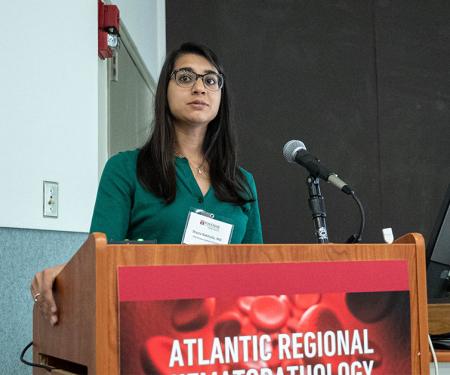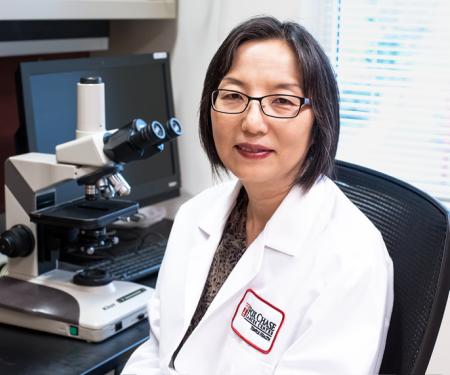Related Articles
00 / 00
-

top doctors
-

Dr. Nakhoda
-

Y. Lynn Wang, MD, PhD, FCAP
-

-

-

-

-

Y. Lynn Wang, MD, PhD, FCAP

Medical Director, Molecular Pathology
Professor, Department of Pathology; Cell Signaling and Microenvironment
CLL/Lymphoma and Molecular Pathology
As a physician-scientist, Dr. Wang is the principal investigator of several translational research projects on aberrant signal transduction pathways in B-cell lymphoma and leukemia.
1. Targeting B-cell receptor signaling (BCR) in lymphoid malignancies. Wang lab is one of the pioneers who explored the idea of targeting BCR signaling in lymphoid malignancies before BCR-directed therapies become well-known and successful. Using inhibitors of LYN, SYK and BTK, the lab has demonstrated the critical role of BCR signaling in lymphoma cell proliferation and survival in diffuse large B cell lymphoma (DLBCL), CLL and mantle cell lymphoma. Their work helped open a new therapeutic area.
2. Mechanisms of resistance to BCR-targeted therapies. An important aspect of Dr. Wang’s work on BCR signaling-targeted therapies focuses on the characterization of the molecular mechanisms underlying drug sensitivity and resistance. In particular, Wang lab contributed significantly to the understanding of the mechanisms leading to primary and secondary resistance to BTK inhibition including their discovery of the BTK C481S mutation. Their innovative work had resulted in two US patents besides publications.
3. Strategies to overcome BCR resistance. Besides revealing the resistance mechanisms to BCR-targeted therapies, Wang Lab also works on developing strategies to overcome such resistance. The research has helped shape the development of second generation of BTK inhibitors as well as development of new strategies to overcome resistance by the lab and by the scientific community at large.
4. Applications of new therapeutic models in lymphoma and CLL for the investigation of drug sensitivity and resistance. Wang Lab is in the process of making therapeutic models in lymphoma and CLL. These models will be used to identify individualized therapy to patients’ specific tumors. In addition, the models may also be used to develop novel therapies and novel therapeutic combinations. Their work on model development was selected as an oral presentation at a national congress and has been accessed more than several thousand times by other scientists since its publication.
Clinically, Dr. Y. Lynn Wang, a board-certified molecular pathologist, is specialized in the development and interpretation of molecular and genomic clinical assays including PCR, RT-PCR, FISH, Sanger sequencing and Next-gen sequencing assays. She served as the Founding Director of the Genomic and Molecular Pathology Division at the University of Chicago and Director of Molecular Hematopathology at Weill Cornell Medical College before she joined Fox Chase Cancer Center in 2018. She contributed 76 publications to the medical and scientific literature. Many of them are well cited including the report in the New England Journal of Medicine and two top-cited articles in Leukemia. She is one of the most published authors in the Journal of Molecular Diagnostics. Dr. Wang is an inventor on two issued US patents.
Twitter: @DrLynnWang
Aldana Vistarop, PhD, postdoctoral fellow
Erina McKinney, MD, visiting medical student
At the American Society of Hematology Meeting in December 2019, Dr. Y. Lynn Wang gave an overview of her team’s chronic lymphocytic leukaemia proliferation model, which has demonstrated the benefits of combining ibrutinib and venetoclax. Video from ASH 2019 (December 8, 2019. 5:11)
Wang Lab works on signaling pathways and molecular-targeted therapies in CLL and non-Hodgkin lymphoma with emphasis on:
Guo A, Lu P, Galanina N, Nabhan C, Smith SM, Coleman M, and Wang YL. Heightened BTK-dependent cell proliferation in unmutated chronic lymphocytic leukemia confers increased sensitivity to ibrutinib. PMID: 26717038. Oncotarget. 7: 4598-610, 2016 PubMed
Sharma S, Galanina N, Guo A, Lee J, Kadri S, Van Slambrouck C, Long B, Ming M, Furtado LV, Segal, JP, Stock W, Venkataraman G, Tang W-J, Lu P, and Wang YL. Identification of a structurally novel BTK mutation that drives ibrutinib resistance in CLL. PMID: 27626698. Oncotarget.7:68833-41, 2016 PubMed
Cheng S, Guo A, Lu P, Ma J, Coleman M, and Wang YL. Functional Characterization of BTKC481S mutation that confers ibrutinib resistance: Exploration of alternative kinase inhibitors. PMID: 25189416. Leukemia. 29:895-900, 2015. Ranked as one of most highly cited papers published in Leukemia from 2015 in December 2017. PubMed
Zhang SQ, Smith SM, Zhang SY, and Wang YL. Mechanisms of ibrutinib resistance in chronic lymphocytic leukemia and non-Hodgkin lymphoma. PMID: 25858358. Br J Haematol. 170:445-56, 2015 PubMed
Ma J, Xing W, Coffey G, Dresser K, Lu K, Guo A, Raca G, Pandey A, Conley P, Yu H and Wang YL. Cerdulatinib, a novel dual SYK/JAK kinase inhibitor, has broad anti-tumor activity in both ABC and GCB types of diffuse large B cell lymphoma. PMID: 26575169. Oncotarget. 6: 43881-96, 2015. PubMed
Cheng S, Ma J, Guo A, Lu P, Leonard JP, Coleman M, Liu M, Buggy JJ, Furman RR, and Wang YL. BTK inhibition targets in vivo CLL proliferation through its effects on B-cell receptor signaling activity. PMID:24270740. Leukemia, 28: 649-57, 2014. PubMed
Furman RR*, Cheng S*, Lu P*, Setty M, Perez A, Guo A, Racchumi J, Xu G, Ma J, Coleman M, Buggy J, Leslie C, and Wang YL. Ibrutinib resistance in chronic lymphocytic leukemia. PMID: 24869597. N Engl J Med. 370: 2352-4. 2014 *Co-first authors. PubMed
Ma J, Lu P, Guo A, Cheng S, Zong H, Martin P, Coleman M, and Wang YL. Characterization of ibrutinib-sensitive and -resistant mantle lymphoma cells. PMID:24957109. Br J Haematol. 166:849-61, 2014. PubMed
Cheng S, Coffey G, Zhang XH, Shaknovich R, Song Z, Lu P, Pandey A, Melnick AM, Sinha U and Wang YL. SYK inhibition and response prediction in diffuse large B-cell lymphoma. Blood. 118, 6342-52, 2011. PubMed Collapse
The following ratings and reviews are based on verified feedback collected from independently administered patient experience surveys. The ratings and comments submitted by patients reflect their own views and opinions. Patient identities are withheld to ensure confidentiality and privacy. Learn more about our Patient Experience Ratings.

top doctors

Dr. Nakhoda

Y. Lynn Wang, MD, PhD, FCAP





Y. Lynn Wang, MD, PhD, FCAP
Patient comments